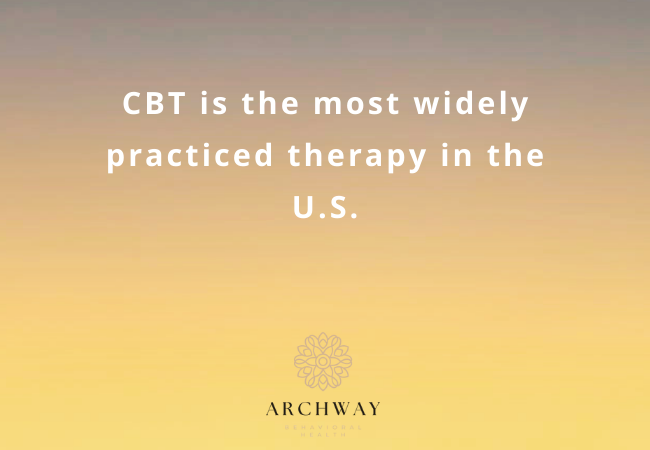Mental health challenges don’t always begin with external circumstances—they often start with the way we think. Cognitive Behavioral Therapy (CBT) is a proven, evidence-based treatment that helps individuals identify and change negative thought patterns to improve emotional and behavioral outcomes. Whether you’re experiencing anxiety, depression, bipolar disorder, or trauma, CBT offers practical, structured tools to build resilience and improve well-being.
At Archway Behavioral Health, we offer Cognitive Behavioral Therapy in Florida across all levels of care—including Individual Therapy in Florida, Group Therapy in Florida, our Partial Hospitalization Program Florida (PHP), and Intensive Outpatient Program in Florida (IOP). No matter where you are on your journey, CBT can help you take positive steps toward emotional balance and mental clarity.
Here are 10 CBT exercises you can use today to start improving your mental health and regaining control over your thoughts and feelings.
1. Thought Records (Cognitive Restructuring)
This foundational CBT tool helps you examine automatic thoughts, assess their validity, and reframe them in a more balanced way.
How to do it:
- Write down a distressing thought.
- Identify the situation that triggered it.
- Rate the intensity of the emotion (0–100%).
- Look for evidence for and against the thought.
- Replace it with a more balanced perspective.
Why it works:
Cognitive distortions often happen automatically. Thought records slow down this process, allowing you to challenge and correct distorted thinking.
Best for:
Anxiety, depression, self-criticism, perfectionism
2. Behavioral Activation
Depression and low mood can create a cycle of withdrawal and inactivity. Behavioral activation involves intentionally scheduling positive and meaningful activities—even when motivation is low.
Examples:
- Going for a short walk
- Taking a shower and getting dressed
- Calling a friend
- Preparing a healthy meal
Why it works:
Small actions can improve mood, increase a sense of accomplishment, and disrupt the cycle of inertia common in depressive states.
Best for:
Depression, bipolar disorder, seasonal affective disorder
3. Identifying Cognitive Distortions
Many people fall into the trap of unhelpful thinking patterns without realizing it. This exercise involves learning to recognize distortions like:
- All-or-nothing thinking (“If I fail once, I’m a failure.”)
- Catastrophizing (“Everything will go wrong.”)
- Personalization (“This is all my fault.”)
- Mind reading (“They must think I’m incompetent.”)
Why it works:
Labeling and identifying distortions reduces their power and allows for healthier, more flexible thinking.
Best for:
Anxiety, social anxiety, low self-esteem
4. Thought-Stopping Techniques
When intrusive or spiraling thoughts take over, thought-stopping techniques can interrupt the cycle.
Techniques include:
- Saying “STOP” out loud or mentally
- Visualizing a red stop sign
- Snapping a rubber band on your wrist
- Shifting your focus to a sensory-based activity (e.g., holding an ice cube)
Why it works:
Provides immediate relief from overwhelming thoughts and opens space for more intentional responses.
Best for:
Panic attacks, obsessive thinking, trauma-related triggers
5. Gratitude Journaling
Shifting focus to the positive—especially when you’re struggling—can help change your perspective over time.
Exercise:
Every day, write down 3 things you’re grateful for and why they matter to you.
Why it works:
Gratitude rewires the brain to notice positives, counteracts negativity bias, and boosts mood.
Best for:
Chronic stress, depression, emotional numbness
6. Socratic Questioning
This method teaches critical thinking to challenge irrational or extreme beliefs.
Questions to ask yourself:
- What’s the evidence for this thought?
- What’s the worst, best, and most likely outcome?
- Have I been in a similar situation before? How did it turn out?
- What would I tell a friend in this situation?
Why it works:
Encourages a more balanced view of problems and enhances problem-solving skills.
Best for:
Catastrophic thinking, performance anxiety, fear of judgment
7. Activity Scheduling and SMART Goal Setting
Goal setting can help structure your time and give your day direction—especially when motivation is low or symptoms are overwhelming.
How to do it:
- Use a planner or digital calendar to block off time for specific tasks.
- Set SMART goals: Specific, Measurable, Achievable, Relevant, and Time-bound.
Why it works:
Reduces overwhelm, promotes routine, and reinforces success through small wins.
Best for:
ADHD, depression, executive dysfunction, low motivation
8. Mood Tracking
This involves recording your emotions throughout the day to identify patterns, triggers, and trends over time.
What to track:
- Mood rating (1–10)
- Activities
- Thoughts
- Triggers
- Physical symptoms
Why it works:
Helps you notice what affects your mood (positively or negatively) and promotes self-awareness and early intervention.
Best for:
Bipolar disorder, PMDD, chronic stress, emotional dysregulation
9. Problem-Solving Skills Training
CBT emphasizes the development of practical problem-solving abilities to manage real-life stressors.
Steps:
- Define the problem
- Brainstorm possible solutions
- Evaluate pros and cons
- Choose and try a solution
- Reflect and revise if needed
Why it works:
Increases confidence, reduces helplessness, and fosters a sense of control.
Best for:
Generalized anxiety disorder, relationship stress, life transitions
10. Exposure Hierarchies
Avoidance maintains fear. This CBT exercise gradually exposes you to feared or avoided situations, starting with those that cause mild discomfort and building up.
Steps:
- Create a list of feared situations (rated by anxiety level)
- Start with the least scary situation
- Practice exposure repeatedly until anxiety decreases
- Move to the next level on the hierarchy
Why it works:
Helps retrain the brain to see feared situations as safe, reducing avoidance and increasing confidence.
Best for:
Phobias, social anxiety, PTSD
How CBT Is Used in Our Programs at Archway Behavioral Health
We tailor our Cognitive Behavioral Therapy in Florida to fit the unique needs of each client. Whether you’re seeking help with a specific diagnosis or struggling with daily stressors, our programs use CBT to promote real-world change.
Individual Therapy in Florida
One-on-one sessions where clients work with licensed therapists to challenge harmful thought patterns and replace them with healthier habits.
Group Therapy in Florida
Structured groups that promote discussion, skill-building, and peer accountability. Ideal for learning and practicing CBT techniques with support.
Partial Hospitalization Program Florida (PHP)
Full-day programming that integrates CBT with trauma-informed care, psychiatric support, and holistic activities.
Intensive Outpatient Program in Florida (IOP)
Structured support several days per week to help clients maintain recovery, reduce symptoms, and apply CBT tools in everyday life.
Who Can Benefit from CBT?
At Archway Behavioral Health, we use CBT as a core part of our Mental Health Treatments in Florida, especially for clients navigating:
- Anxiety Treatment in Florida
- Bipolar Treatment in Florida
- Depression and mood disorders
- PTSD and trauma recovery
- Substance use disorders
- Co-occurring conditions
Whether you’re entering therapy for the first time or looking to deepen your current work, CBT offers the structure and tools to move forward.
Why Choose Archway Behavioral Health?
We’re more than just a Mental Health Treatment Center in Florida—we’re a team of compassionate, experienced professionals committed to helping you thrive. Our CBT approach is integrated, personalized, and evidence-based.
- Expert clinicians trained in CBT, DBT, and trauma-informed care
- A full continuum of care from outpatient therapy to PHP and IOP
- Safe, inclusive, and welcoming environment
- Individualized treatment plans that reflect your values and goals
- Long-term recovery and life-skills support
Conclusion
Improving your mental health doesn’t always require major life changes—it often starts with small, intentional shifts in the way you think. The Cognitive Behavioral Therapy (CBT) exercises outlined in this post are more than just tools; they are daily practices that can help you reframe challenges, manage emotional overwhelm, and gain confidence in your ability to navigate life.
At Archway Behavioral Health, we believe that healing begins with knowledge, support, and the right therapeutic strategies. Whether you’re struggling with anxiety, depression, bipolar disorder, or trauma, CBT can help you break free from negative patterns and start building the life you deserve. And you don’t have to do it alone.
Our expert clinicians offer individualized and group support through Cognitive Behavioral Therapy in Florida, available across all levels of care—including Individual Therapy in Florida, Group Therapy in Florida, our structured Partial Hospitalization Program Florida (PHP), and flexible Intensive Outpatient Program in Florida (IOP). If you’re ready to take the first step toward better mental health, call us today at 888.488.4103. Our team is here to listen, support, and help you create a personalized path to recovery.
FAQ About CBT Exercises and Mental Health
What is Cognitive Behavioral Therapy (CBT)?
CBT is a goal-oriented, evidence-based therapy that helps individuals recognize and reframe negative thoughts and beliefs to improve emotional well-being and behavior. It’s widely used for treating anxiety, depression, bipolar disorder, trauma, and more.
Can I practice CBT exercises on my own?
Yes! Many CBT tools—like thought records, gratitude journaling, and mood tracking—can be practiced independently. However, working with a trained therapist helps deepen understanding and customize strategies to your unique needs.
How long does it take to see results from CBT exercises?
Many people begin to notice improvements in mood and thinking within just a few weeks of consistent practice. Long-term, CBT can create lasting change in how you respond to life’s challenges.
Are CBT exercises part of therapy at Archway Behavioral Health?
Absolutely. We incorporate CBT exercises into Individual Therapy in Florida, Group Therapy in Florida, and structured programs like our Partial Hospitalization Program Florida (PHP) and Intensive Outpatient Program in Florida (IOP).
How does CBT differ from DBT?
CBT focuses on changing unhelpful thoughts and behaviors, while Dialectical Behavior Therapy in Florida also integrates emotional regulation, mindfulness, and distress tolerance—especially for those with intense emotional reactivity or trauma.
Who can benefit from CBT at Archway Behavioral Health?
CBT is ideal for individuals struggling with anxiety, depression, bipolar disorder, trauma, and other mental health challenges. It’s a core part of our Mental Health Treatments in Florida designed to promote resilience and long-term wellness.



